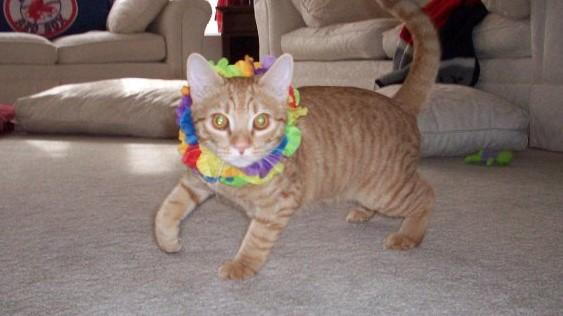Why Should I Spay or Neuter my Pet?

- posted: Jan. 29, 2022
Why Should I Spay or Neuter my Pet?
February is spay/neuter awareness month. Besides the obvious attempt to reduce pet overpopulation, why do vets and shelters always advocate for spaying and neutering pets and what exactly do those terms mean?
Spay refers to the removal of a female animal’s ovaries and uterus. Neuter usually refers to castration—removal of both testicles. Non-spayed and non-neutered pets can experience a variety of health and behavior issues as they age which can be reduced or eliminated by spaying or neutering.
Intact (un-neutered) male dogs can experience enlargement of the prostate gland as they age which may cause pain and difficulty urinating. Intact males are also at an increased risk of developing prostate infection and testicular tumors. Males also have some risk of developing perianal hernias (a serious condition in which an opening of the muscle layers next to the anus can cause the bladder or other organs to become trapped) and tumors around the anus if not neutered. Male dogs may also be more likely to run away and have a higher incidence of being hit by a car, have a higher incidence of urine marking and may be more aggressive and likely to fight than neutered males.
Male cats do not appear to develop prostate issue or testicular tumors if left intact, but their urine has an extremely strong, unpleasant odor and they are more likely to mark territory with urine if not neutered. Neutering cuts down on these undesirable behaviors. Intact male cats also have a higher risk of bite wounds and a higher incidence of contracting Feline Immunodeficiency Virus (FIV) from fighting and, like intact male dogs, a higher risk of being hit by a car.
Unspayed female dogs and cats can develop some serious health concerns. One life threatening problem is a condition called pyometra. Pyometra literally means “pus-filled uterus”. If a dog’s or cat’s uterus becomes infected the pet can become extremely ill, go into shock and may die. If the uterus ruptures, pus can fill the abdomen causing severe peritonitis. Dogs and cats with pyometra present a surgical emergency—they need to be spayed immediately for the best chance of recovery. Females are also at risk of developing breast tumors as they get older if they are not spayed when young. About 50% of breast tumors found in mature female dogs are cancerous and 85% of those found in cats are cancerous. To a lesser degree, females may also develop ovarian or uterine tumors.
Rabbits can develop cancers of the sex organs and health and behavior issues similar to those of dogs and cats such as urine marking, aggression and pyometra if not spayed or neutered. Rabbits are typically spayed and neutered at 4-6 months of age. Ferrets should also be spayed and neutered when young (unless being used for breeding). If female ferrets go into heat and are not bred, they will develop a severe aplastic anemia and die. Spaying and neutering ferrets also reduces their musky odor. And, while less common, spaying and neutering pet rats may also reduce health issues such as mammary tumors.
Other than minor anesthesia risks and occasional post-operative infections or incision failures, the risks of spay/neuter surgeries are few. However, the issue has become a bit more complicated as new studies show that spaying and neutering pets very early in life could potentially cause other health risks like skeletal problems, especially in large and giant breed dogs. The vets at Patton Veterinary Hospital recommend waiting until large or giant breed dogs (dogs over 50 pounds as adults) are twelve to eighteen months old before spaying or neutering. Smaller dogs and cats can be altered at four to six months of age. Shelter medicine guidelines may differ. Have a discussion with your vet about the pros and cons of spaying or neutering and the best age at which to do so. Find out what works best for your pet and his or her lifestyle and for your family.
This blog brought to you by the Patton Veterinary Hospital serving Red Lion, York and the surrounding communities.
https://www.aaha.org/your-pet/pet-owner-education/ask-aaha/spay-or-neuter/
Location
Patton Veterinary Hospital
425 E Broadway
Red Lion, PA 17356
